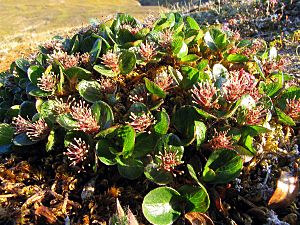Polar willow facts for kids
Quick facts for kids Polar willow |
|
|---|---|
 |
|
| Scientific classification |
|
| Kingdom: | Plantae |
| Clade: | Tracheophytes |
| Clade: | Angiosperms |
| Clade: | Eudicots |
| Clade: | Rosids |
| Order: | Malpighiales |
| Family: | Salicaceae |
| Genus: | Salix |
| Species: |
S. polaris
|
| Binomial name | |
| Salix polaris Wahlenb.
|
|
| Script error: The function "autoWithCaption" does not exist. | |
Script error: No such module "Check for conflicting parameters".
The polar willow (Salix polaris) is a type of willow plant. It grows in very cold places around the North Pole, like the high Arctic tundra. You can find it as far north as land goes. It also grows south of the Arctic in mountains. These mountains are in Norway, the northern Ural Mountains, the northern Altay Mountains, Kamchatka, and British Columbia, Canada.
What It Looks Like
The polar willow is one of the smallest willows in the world. It is a very short, creeping shrub that lies flat on the ground. It usually grows only about 2 to 9 centimeters (1 to 3.5 inches) tall. It has branches that grow underground, just below the soil surface.
Its leaves are round or oval-shaped. They are about 5 to 32 millimeters (0.2 to 1.3 inches) long and 8 to 18 millimeters (0.3 to 0.7 inches) wide. The leaves are dark green and have smooth edges.
Flowers and Fruit
The polar willow has separate male and female plants. This means a plant is either male or female, not both. Its flowers grow in short, fuzzy clusters called catkins. Each catkin has only a few flowers. After flowering, the female plants produce a brownish, hairy capsule. This capsule holds the seeds.
Where It Grows
The long, creeping stems of the polar willow can grow roots as they spread. They often grow in thick mats of mosses and lichens. These mats help to hold the plants together and protect them from strong winds. The polar willow can grow well in open gravel areas. It also thrives in places with lots of other plants.
Scientists have found fossils of the polar willow. These fossils are from the Pleistocene ice ages. They show that this plant once grew further south in Europe. Fossils have been found in southern England, the Alps, and the Carpathians.
See also
 In Spanish: Salix polaris para niños
In Spanish: Salix polaris para niños
 | Misty Copeland |
 | Raven Wilkinson |
 | Debra Austin |
 | Aesha Ash |

